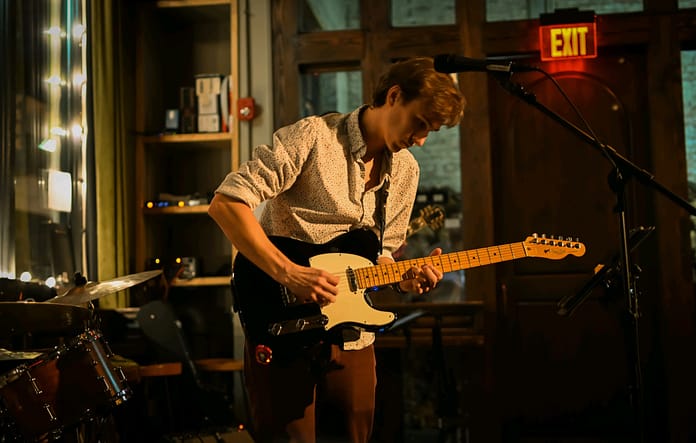Ryan Yingst is one such eminent figure; he is a multi-talented musician, songwriter, and recording engineer.
Yingst is a seasoned multi-instrumentalist whose sound has reverberated in major venues around the country, leaving an unmistakable impact on a wide variety of albums and singles.
From Pittsburgh, Pennsylvania, Yingst set out on an epic adventure to the thriving music mecca of Nashville. His first record was released to critical acclaim in 2020, and he promptly began packing up his musical equipment and heading south.
This was a watershed moment in his career, marking his arrival from the shadows as a recording engineer and supporting Sideman to the bright lights of the Nashville stage.
Yingst’s influences come from a wide range of musical mastery, including the eerie lament of Jeff Buckley, the nuanced indie-rock of The Shins and Elliot Smith, the soulful ballads of Charles Bradley and Bill Withers, the jazzy escapades of Grant Green, the alternative charm of The Smiths and Slaughter Beach, the exotic world fusion of Beirut, and the modern stylings of Theo Katzman.
Yingst is now working as an audio engineer and producer at Plus Minus Recording, where he is able to work his sonic magic. Recently, he recorded a set of live-tracked songs in a stripped-down, personal direct-to-vinyl session at Brooklyn’s Leesta Vall Studios.
His catalogue is as extensive as it is varied, including both commercially released albums and self-produced singles, as well as an EP and a double single with live tracks. Yingst is a musical chameleon, and his most recent project finds him collaborating with the band Tophouse on an intriguing new song and music video.
Proud to have earned his Bachelor of Music from Duquesne University in 2017, Yingst has worked tirelessly to carve out a place for himself in the music business by drawing on his expertise in music technology and performance. His most recent album, “Please Don’t Burn the Sage,” was co-written and recorded at his Nashville home with Shane Weisman and himself.
As a co-producer, Weisman gave his skills as an electric guitarist, keyboardist, and drummer. Yingst then added emotional depth through guitar and voice, expertly fusing the two to create a sonic elixir. Sean Cho’s mastering work at Pittsburgh’s +/- Recording is the icing on the cake.
A heartbreaking song about a lover’s death, “Please Don’t Burn the Sage” is sung from the viewpoint of a person in sorrow. The protagonist, at the urging of his deceased, loved one, explores the physical world as a ghost, evoking a touching story of love, sorrow, and desire.

What kick-started your songwriting journey?
I started writing seriously after spending some time on the road with other acts after college. I had always written, but in music school, my focus was much more on developing technical skills, and I always felt like I was playing catch-up.
The more I learned, the more I saw that there was to learn. So after starting to play my songs out with friends and getting enough positive feedback, I gradually became comfortable with the idea of putting parts of myself out to the world in my music.
What’s the most thought-provoking piece you’ve ever written?
I believe it’s my current release, Please Don’t Burn The Sage. Some of my other songs may have more veiled meanings, but I believe this tune is the most thought-provoking because of its relatability and perspective.
Looking at death from the inside out while questioning how far you would go for the ones you love, is something, I hope, that makes the listener look inward.
Where’s your creative sanctuary?
My creative sanctuary is really dependent on the day. I use to love getting lost in the woods to write when I was younger in central PA, and I still find nature to be a massive boost to my writing creativity.
While I’m recording, my sanctuary is a collaborative space. I don’t like recording in a space where every member is separated and in ‘pristine’ recording mode. I like to hear chatter, grit and honesty in a recording. I don’t mind if a little of the guitar gets in the drum recording as long as I can get everyone to give their best performance.
What would you say is your greatest strength as an artist?
I stay really focused on trying to improve in all areas and it’s sometimes hard to answer this one. I would have to say my authenticity. I put a piece of myself into every song I write and into every performance.
I keep improvisation active in every performance and that helps me to make sure no two performances are truly the same. I want to feel like I’m creating something new every time I step in front of a crowd.
What is your creative process when making music?
When I’m writing it’s usually music first. I’m largely driven by harmony and I compose my melody around the feeling the harmony imparts. To be honest, though, that can change on a dime.
If some melody hits me I’ll pull everything around that, like in my song ‘For Your Love’ off my electronic EP ‘Mediations on Empty Streets’. It’s really just about chasing the inspiration wherever you can feel it.
Often that ends up disappearing right out from under you as you try to follow it, but if you can channel it, you can let something honest flow out of you and it’s the best feeling. ‘Please Don’t Burn The Sage’ was a complete departure from my norms of writing and was written similarly to my song ‘Boxcar’, in that it came from lyrics and narrative-driven structure.
What inspired you to write you “Please Don’t Burn The Sage”?
This song was inspired by a couple of back-to-back years of struggle. I had lost some friends, and family and felt myself starting to look at my own mortality in a different light after I was attacked on the street in a random attack from behind by a mentally ill person in my city left me with several broken bones and in need of reconstructive facial surgery.
I wanted to explore the encroaching feeling that was building, but so much of my writing already comes out sad and dark, that I wanted to try a different approach. This song was a reflection of my own relationship and our long-established policy that if one of us died we had to ‘haunt’ the other just to stick around. So I opened that concept up and it has been incredibly therapeutic for me.
What are the things you do to help perfect your craft?
Practice, practice, practice! As a songwriter, I think the best asset I can add is to continue my musical study. I’m a huge music theory nerd and I love seeing how music theory can be a shortcut to developing better songs.
I work at being a better guitarist every day and I don’t expect to ever feel like I know ‘enough’ of that. I also listen to a lot of different styles to get inspiration, but also as a study performance techniques and to pick apart licks or styles that I can steal and repurpose.
What are your plans for extending your music beyond USA and Europe?
I would really love to spend some time overseas playing. The life of a small independent artist is a constant struggle of balancing budgets and dreams.
Thanks to playlisting, reviews and some blogs that have picked up on my playing, I have some wonderful listeners in Brazil, Chile, Norway, parts of Asia throughout Europe and have had good luck with some radio play in Europe, so I hope to continue to build that audience one at a time until I have the opportunity to perform in their countries.
What’s the highlight of your career so far?
I have had some bigger performances and achievements, but one spot that sticks out to me would probably be when I was touring and had the chance to play at House of Blues Chicago.
That spot is sacred to me, and I was able to perform in the same spot as one of my heroes, Jeff Buckley. Something about that just felt different to me and it’s still one of my most fond performance memories.
But I’m always looking forward and I have a feeling, based on the recording sessions, that some of my new singles that I’m getting ready to release will become my new most treasured musical memories.
What are future plans for your music and you as a brand?
I have a hard time thinking of myself as a brand. I will be moving to Boston the next year and I’m so excited to get back to performing at some of my favourite venues in the Northeast, while still travelling back to Nashville often to play.
I have a bunch of music I’ve been writing that is sitting in the vault at the moment, so getting that out is going to be my big focus for a bit. I have plans for tours and more, and when I really think about it, it feels like I haven’t even started my journey.

